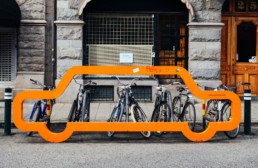Real Estate Investment Mistakes to avoid: Resale vs. Pre-Construction Condos
Whether you are a new or seasoned investor, finding a property worth your investment can take a great deal of time and research. Among the many factors to weigh, deciding between resale or pre-construction can be challenging.
Toronto real estate guru and founder of truecondos.com, Andrew la Fleur, recently posted a podcast discussing just that; resale vs pre-construction condos for investment purposes.
In the podcast, Andrew talks about the "why" behind pre-construction condo investing and answers many of the most common objections to investing in pre-construction condos such as, "Isn't it better to buy resale and get income right away?" and "Aren't houses a better investment than condos?".
I want rental income right away
 It is extremely hard to find positive cash flow properties in the resale market today. If it was easy, then everyone would be doing it; but that's not the case.
It is extremely hard to find positive cash flow properties in the resale market today. If it was easy, then everyone would be doing it; but that's not the case.
There are three issues here; firstly, you are paying a massive premium when you are buying resale. Remember, the person you are buying it from paid much less in pre-construction than the price that you are paying them today. You are paying a massive premium over what price you could have bought that unit for.
Secondly, there are a lot of inflationary pressures. Buying a cash flowing asset, like a pre-construction condo, is a fantastic inflation hedge. Prices are going up in the market constantly; every year prices keep going up due to these inflationary pressures; including rental rates. When you purchase pre-construction at a certain price, the value of that asset goes up over time before it is built, as does the amount of rent that that property can generate.
For example, if you purchased a condo in 2010 or 2011 and you rent it out today, a few years later, the rent that you can get today on that condo is much higher than the rent you could have got 4-5 years ago. The price that you paid for that unit 4-5 years ago for that unit is much cheaper than the price you would pay for that today. So, when you are buying something pre-construction, by the time that it is finished, you are in a very good cash flowing position (in most cases) because rental rates have increased significantly over time. Also, you are in a very good equity position because the value of that asset, the price of that asset, has also gone up tremendously over time.
Finally, on wanting rental income right away, there is nothing wrong with wanting rent right away, but with that rental income comes management, comes taxes to pay, and comes time and effort to spend on getting that income. When you are buying pre-construction, you don't have to do anything; your money is in the market, you're taking advantage of that inflation hedge and equity is growing, and you won't have to think about it for a number of years.

I don't want to pay closing costs
You still pay the closing costs. Keep in mind, someone already paid the closing costs and they are, no doubt, accounting for them in the price of the resale unit. People will not sell at a loss unless forced to. 95% of the time when someone is selling they are accounting for all those costs and trying to make a profit.
Closing costs are constantly going up; this is another inflationary pressure. Closing costs are essentially taxes imposed by different layers of government on real estate transactions and particular on new properties that are being built. You might think you are avoiding these closing costs, but you will pay them eventually; these costs will be passed along to you in the resale market.
I want to be able to see what I am getting in-person
You may think you need to see it, touch it, feel it before making your decision, but why? You should have an investor's mentality first and foremost; you are never going to live there. This is purely a financial decision, a logical decision.
Part of the pre-construction investing game is the existence of risk and reward. Pre-construction might not be for everyone, if you need to see it and touch it, it's probably not for you.
Isn't resale cheaper?
Most of the time, yes it is because the average resale property is old. When you are talking about a commodity like condos, something that is newer is going to cost more. However, the older product will cost you more to maintain and will generate a lower retain income, and it will have a higher depreciation rate. Just goes to the old adage 'you get what you pay for.'
"The goal of every condo investor should be to find the diamonds in the rough, and if you can do that you are set and you will do very well with your investments." - Andrew la FluerCheck out the full 30-minute podcast here: Why Invest in Pre-construction Condos (fast-forward to 20:45 to listen to the four objections, debunked).
Visit us at the sales centre in East Village to find out how a pre-construction investment property at INK could be right for you. We have numerous resources and third-party studies analyzing how each unit will cash flow, and we can help you find the right fit for your investment portfolio.
Questions? Call us at 403.452.9268.
Erin @ Battistella
Five Reasons Why I Ditched My Car
I am about a year and a half into my car-free living experiment and I couldn’t be happier!
My partner and I had been living in a one-car household in downtown Calgary for about two years when we decided to test out the car-free lifestyle. I was biking to work throughout the summer and, apart from the occasional Costco shop or out-of-town trip, I found we didn’t really need our car anymore.
Working at INK, a transit-oriented development, I often get the chance to talk to individuals who are considering the car-free lifestyle. I love being able to share my experiences first-hand with them and help them in their decision.
Here are the top five reasons why I did it.
I never drove it
 I really only used my car once or twice a week, and the rest of the time it remained parked underground. Often I found myself using it out of sheer laziness when I could have easily chosen to another transportation option.
I really only used my car once or twice a week, and the rest of the time it remained parked underground. Often I found myself using it out of sheer laziness when I could have easily chosen to another transportation option.
In fact, upon further research, I realized I am not alone. According to the website reinventingparking.org, the average vehicle is parked 96% of the time!
It was expensive
Considering I rarely drove my car, the expense I incurred to hang onto it really didn’t make sense. Each month my car payment, insurance, and gas costs (not to mention maintenance and unexpected costs) were draining funds from my bank account that could have been used elsewhere.
For me, going car-free meant an annual savings of $7,107! I could think of way more fun stuff to do with that money, and I have!
Here are how my numbers stacked up:
Monthly Payment = $383
Insurance = $109.25
Gas = $100 (Average $25/week)
Total monthly = $592.25
That does not even include regular maintenance, car washes, depreciation or emergency repairs!
When I decided to write this blog, I wanted to know how my numbers compared to the average and, in fact, I found that I was even on the low end.
Edmond’s.com quotes the average car payment at $483 per month and caa.ca estimates a compact car will cost you $8,469 annually. Find out how much your car is costing you here.
Alternative transportation options
On top of the monthly expenses from a car that I never drove, I was also already investing in alternate forms of transportation like transit and Car2go. In fact, I found myself using alternate forms of transportation more than my car. Rather than pay for both, I simplified and ditched my car.
Today, my main source of transportation is by bike and, with the addition of the downtown cycle track and the river pathway system, getting from one side of downtown to the other has never been easier. It takes me less than ten minutes to bike to work and it is an enjoyable, peaceful way to start my day.
When biking doesn’t make sense one of the many other options such as Calgary Transit, Car2Go, walking, or carpooling are available. If I need to make a longer trip, I can easily rent a vehicle for a very affordable rate, sometimes as low as $15/day.
Parking
Parking in Calgary is the worst and on the days I did need my car, finding a place to park was always an issue!
As if finding a spot wasn’t frustrating enough, next came the crazy prices for parking downtown. Parking comes at a premium in Calgary and if you are working downtown, chances are you are paying an exorbitant amount for parking.
Even if I only  needed hourly parking, finding a spot was frustrating and I often spent longer circling the block than the entire trip took. Good riddance!
needed hourly parking, finding a spot was frustrating and I often spent longer circling the block than the entire trip took. Good riddance!
On the Calgary Parking Authority website, monthly parking costs in Calgary can range from $150-500 depending on type (surface or underground), location, availability, etc. In 2014, Huffington Post listed Calgary parking rates the most expensive in Canada with drivers paying an average of $447 per month!
By going car-free and not worrying about parking, I have saved time, money, and sanity!
Green Living
Finances aside, giving up my car was a great way to go green.
I am always looking for ways to live an eco-friendly lifestyle. From organic, locally sourced produce, green cleaning products, turning the lights off when I leave the room and not wasting water; I do what I can. While I understand it is a necessity for many people to drive (for work, family, etc), I was not one of them. I was happy to give up the luxury of a vehicle and felt a sense of satisfaction in doing my part for the environment.
Here is one of the many great resources available about the green benefits of car-free living: David Suzuki - Alternatives to Driving and Owning a Car
My experience going car-free has been a very positive one. Beyond the reasons listed above, going car-free has been a huge benefit to my fitness (no more guilt for skipping the gym!) and I also feel more connected to my community, able to discovered new streets and neighbourhoods to enjoy.
Although many people were skeptical at the start, they now see my car-free lifestyle as a positive choice rather than a sacrifice, some even deciding to go car-free themselves!
Want to find out more? Come see me at the INK sales centre and let’s talk about it!
Erin @ Battistella
---
More:
UC Berkeley Study: Fewer Cars, Improved Emissions with car2go One-Way Carsharing


